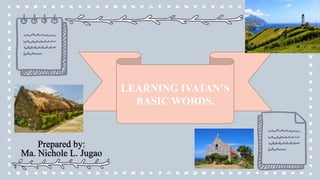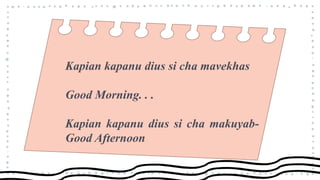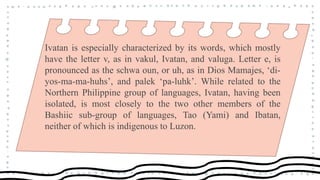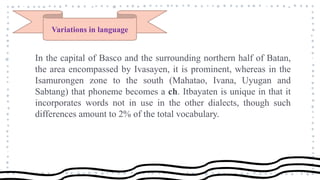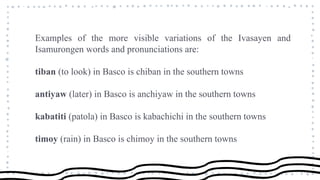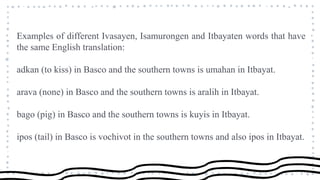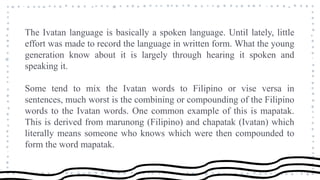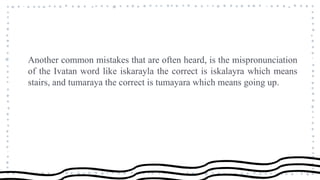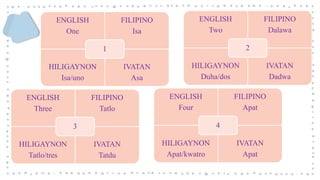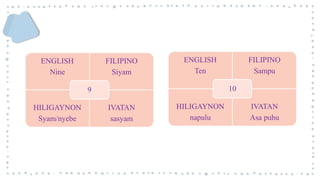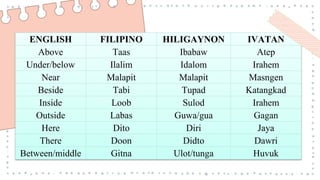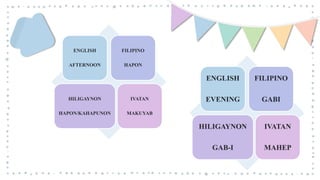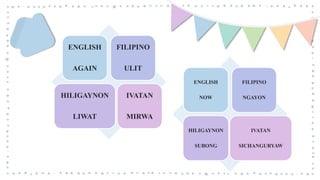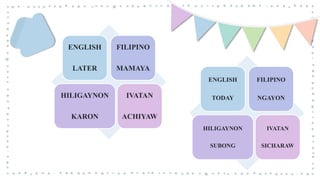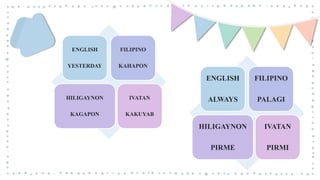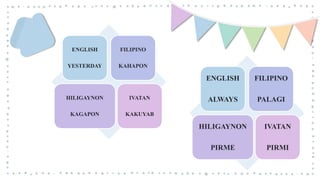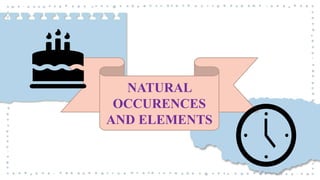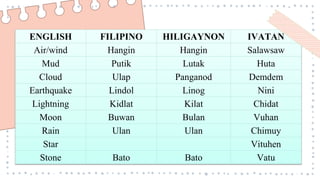IVATAN WORDS.pptx
- 2. Kapian kapanu dius si cha mavekhas Good Morning. . . Kapian kapanu dius si cha makuyab- Good Afternoon
- 3. Ivatan is especially characterized by its words, which mostly have the letter v, as in vakul, Ivatan, and valuga. Letter e, is pronounced as the schwa oun, or uh, as in Dios Mamajes, ‘di- yos-ma-ma-huhs’, and palek ‘pa-luhk’. While related to the Northern Philippine group of languages, Ivatan, having been isolated, is most closely to the two other members of the Bashiic sub-group of languages, Tao (Yami) and Ibatan, neither of which is indigenous to Luzon.
- 4. Variations in language In the capital of Basco and the surrounding northern half of Batan, the area encompassed by Ivasayen, it is prominent, whereas in the Isamurongen zone to the south (Mahatao, Ivana, Uyugan and Sabtang) that phoneme becomes a ch. Itbayaten is unique in that it incorporates words not in use in the other dialects, though such differences amount to 2% of the total vocabulary.
- 5. Examples of the more visible variations of the Ivasayen and Isamurongen words and pronunciations are: tiban (to look) in Basco is chiban in the southern towns antiyaw (later) in Basco is anchiyaw in the southern towns kabatiti (patola) in Basco is kabachichi in the southern towns timoy (rain) in Basco is chimoy in the southern towns
- 6. Examples of different Ivasayen, Isamurongen and Itbayaten words that have the same English translation: adkan (to kiss) in Basco and the southern towns is umahan in Itbayat. arava (none) in Basco and the southern towns is aralih in Itbayat. bago (pig) in Basco and the southern towns is kuyis in Itbayat. ipos (tail) in Basco is vochivot in the southern towns and also ipos in Itbayat.
- 7. The Ivatan language is basically a spoken language. Until lately, little effort was made to record the language in written form. What the young generation know about it is largely through hearing it spoken and speaking it. Some tend to mix the Ivatan words to Filipino or vise versa in sentences, much worst is the combining or compounding of the Filipino words to the Ivatan words. One common example of this is mapatak. This is derived from marunong (Filipino) and chapatak (Ivatan) which literally means someone who knows which were then compounded to form the word mapatak.
- 8. Another common mistakes that are often heard, is the mispronunciation of the Ivatan word like iskarayla the correct is iskalayra which means stairs, and tumaraya the correct is tumayara which means going up.
- 10. CARDINAL NUMBERS
- 15. ENGLISH FILIPINO HILIGAYNON IVATAN Above Taas Ibabaw Atep Under/below Ilalim Idalom Irahem Near Malapit Malapit Masngen Beside Tabi Tupad Katangkad Inside Loob Sulod Irahem Outside Labas Guwa/gua Gagan Here Dito Diri Jaya There Doon Didto Dawri Between/middle Gitna Ulot/tunga Huvuk
- 16. TIME EXPRESSIONS
- 24. ENGLISH FILIPINO HILIGAYNON IVATAN Air/wind Hangin Hangin Salawsaw Mud Putik Lutak Huta Cloud Ulap Panganod Demdem Earthquake Lindol Linog Nini Lightning Kidlat Kilat Chidat Moon Buwan Bulan Vuhan Rain Ulan Ulan Chimuy Star Vituhen Stone Bato Bato Vatu
Editor's Notes
- #8: . This is actually the result of the influence of non-Ivatans who tend to speak the language & were then eventually adopted.
